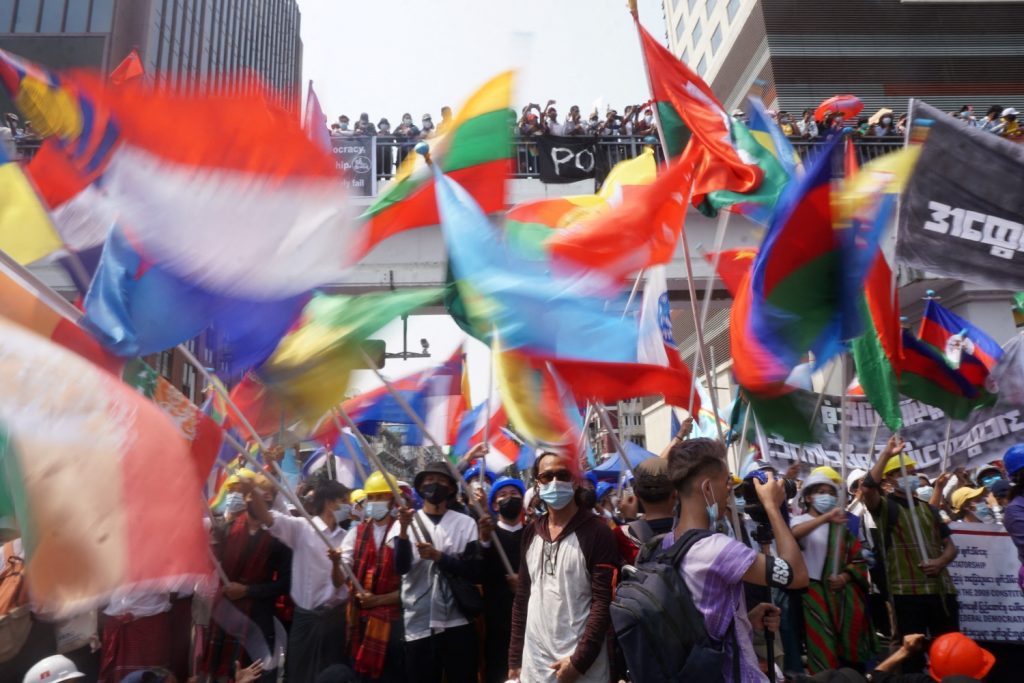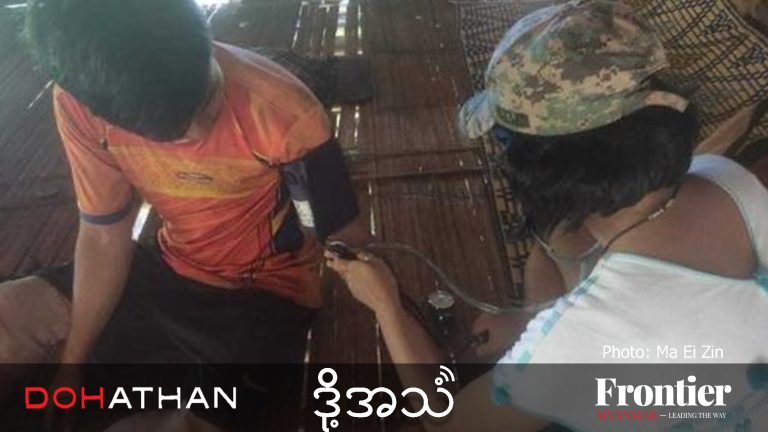The growing democracy movement needs to look beyond Aung San Suu Kyi and the NLD, and listen closely to ethnic voices.
By KYAW HSAN HLAING | FRONTIER
On the morning of February 1, my hopes disappeared when I learned that the civilian government had been overthrown in a military coup. Growing up under army rule, I did not have access to quality education or healthcare, and couldn’t use the internet until 2014. Terrified of the military, my parents always warned me to stay away from politics or activism. Now, I don’t want the next generation to grow up like I did.
Yet while I strongly condemn the military takeover, I do not support the National League for Democracy, or a return to the way things were before. During the NLD’s term, non-Bamar ethnic people like me continued to experience political and socio-economic exclusion, as well as human rights abuses from the military.
Fighting in my native Rakhine State over the past two years between the Arakan Army and the Tatmadaw was particularly severe, and my family spent many nights hiding in a bunker next to our house. Sometimes they ran away from our village when soldiers were nearby.
Since the coup, the whole country has suffered the dangerous consequences of blocked internet access, but in my village in Mrauk-U Township, we were under an internet shutdown from June 2019 until recently. While living in Yangon for my studies, my family would call me daily for news and information they could not access due to the shutdown.
Although conflict between the AA and Tatmadaw escalated in recent years, civil wars between ethnic armed organisations and the Tatmadaw have gone on for more than 70 years in Myanmar. These conflicts have many roots, but one of the reasons they haven’t been solved is the central government’s failure to respect the demands of the ethnic nationalities, particularly for self-determination.
While many ethnic communities trusted Daw Aung San Suu Kyi’s 2015 campaign promise to pursue peace during her term, and were optimistic that we would be listened to and our histories and identities celebrated under her leadership, many of us feel betrayed. Instead of respecting our diversity, her government built statues of General Aung San in non-Bamar areas, appointed its own party members to chief minister positions in all states and regions including Rakhine, where the Arakan National Party won the most seats, and engaged with China on mega-projects on our land, including the Kyaukphyu Special Economic Zone. These actions left many of us feeling like we were living under another form of dictatorship.
On top of this, the NLD failed to speak out against human rights violations committed by the Tatmadaw. I strongly disagree with Aung San Suu Kyi’s defence of the military at the International Court of Justice against charges of genocide for their violent campaign against the Rohingya, and I also felt abandoned when she remained silent as the military committed alleged war crimes and crimes against humanity against the Kachin, Shan, and my own Rakhine people.
In Rakhine, the NLD government took several actions that further alienated ethnic Rakhine people. It called for the Tatmadaw to “crush” the AA, imposed the world’s longest internet shutdown, designated the AA as a terrorist organisation, excluded the AA from its landmark peace conference, and blocked humanitarian assistance to conflict-affected people. These actions did not only affect the AA but put the entire civilian population, including my own family, in danger. I cannot support a government that does such things.
Following the coup, I have joined many pro-democracy protests in Yangon. I believe the current moment offers not only a chance to fight against military dictatorship, but also to bring better understanding between the Bamar and other ethnic groups, so that we can join together to end the decades-long civil wars and build a federal democratic union.
I want to participate wholeheartedly in these protests. But when I stand amid the crowds, I feel a distance between us. Around me, people shout, “Release Mother Suu! Our cause! Our cause!” and, “Accept the 2020 election results! Our cause! Our cause!”
My ethnic nationality friends and I want more.
We want to end not only military dictatorship, but all forms of dictatorship. We want to abolish the 2008 Constitution, which allows the military to play a major role in politics and does not promote ethnic people’s right to self-determination. We want to establish a federal democratic union. We want all political prisoners to be released. But when we shout for the causes we believe in, I sometimes see fear and distrust on people’s faces.
When I look online, I also at times feel disappointed. On February 17, the prominent activist group 88 Generation Peace and Open Society posted on Facebook that “hundreds of thousands are gathering to free Mother Suu”. I agree that she should be released, but by focusing so much on this at the expense of the many other problems our country is facing, I fear that even if the protests succeed, our country could continue to suffer from civil war for decades to come, and may again fall back under military rule.
There is cause for hope, however. Within the broader protest movement, some activists and protest leaders, including from student unions and labour groups, are standing with the ethnic nationalities; and since February 11, a General Strike Committee of Nationalities representing more than 24 ethnic groups have come together to protest.
If the coup fails and the elected government is restored, I hope the NLD will start on a new path towards a genuine federal democratic union. As long as they privilege the interests of the majority, our country will continue to suffer militarisation, violence and civilian displacement.
The current upheaval is devastating, but it also offers a great opportunity. As we join together in opposing military rule, we must also unite under a positive vision that values the rights of all. It is a critical moment in our history, and it must not be squandered.
Kyaw Hsan Hlaing is a researcher and freelance journalist from Rakhine State focusing on peace, human rights and social justice. He has written for TIME, Foreign Policy, The Nation, and Al Jazeera, among other media.
This article was written with support from Emily Fishbein, a freelance journalist also focusing on peace, human rights and social justice in Myanmar.







